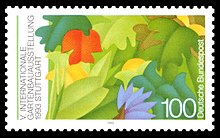1993 World Horticultural Exposition
| AIPH Stuttgart 1993 | |
|---|---|

Stamp for Horticultural Exposition 1993
|
|
| Overview | |
| BIE-class | Horticultural exposition |
| Name | 1993 World Horticultural Exposition |
| Visitors | 7,300,000 |
| Location | |
| Country | Germany |
| City | Stuttgart |
| Venue | Wartburg and Killesburg Park |
| Timeline | |
| Opening | April 23, 1993 |
| Closure | October 17, 1993 |
| Horticultural expositions | |
| Previous | Floriade 1992 in Zoetermeer |
| Next | Expo 1999 in Kunming |
| Specialized expositions | |
| Previous | Genoa Expo '92 in Genoa |
| Next | Expo '98 in Lisbon |
| Universal expositions | |
| Previous | Seville Expo '92 in Seville |
| Next | Expo 2000 in Hanover |
| Simultaneous | |
| Universal | Taejŏn Expo '93 |
| Specialized | Daejeon |
The International horticultural exposition 1993 (short: 1993 IGA ) was held at the Baden-Wuerttemberg state capital, Stuttgart, Germany. The IGA was within the past 54 years already the fifth major horticultural show which hosted Stuttgart in the 20th century.. Recognised by the Bureau International des Expositions (BIE), the Expo ran from April 23, 1993, to October 17, 1993. Held at Wartenberg and Killesberg parks, the goal was to be visually and functionally integrated with the two challenging terrains, the Wartberg and the Leibfriedsche garden. This was achieved. The long Advised long-term goal to pull a U-shaped green belt around the city, which became a reality. The mascot of the horticultural show called "Flori", a bird with a cowboy hat. Overall, 7.3 million people visited the garden show. Thus the expectations of the city fathers were exceeded, because it had been expected a turnout of 7 million.
The organization and management of horticultural event was in the hands of the established by the City and the Central Association of Horticulture IGA Stuttgart'93 GmbH. The chairman was the then-Mayor Manfred Rommel. As early as 1977 was the preparation of temporary and permanent installations, the Technical Department of the City of Stuttgart, headed by Mayor Hans-Dieter Künne, a postdoctoral civil responsibility. In the Parks Department project groups were formed to support sustainable approach.
At Wartberg there was a landscape of extensive use, with virtually no public access. Hedges, ditches, dry stone walls and orchards dominated the terrain. No less challenging was the terrain of Leibfried's garden, which had a woodland park of trees.
Two main issues dominated the garden show at Wartberg, the preservation of an intact environment and the commitment to the concerns of people with disabilities. The land at Wartberg slopes were re-parceled. 40 permanent allotments resulting from this measure. The 3.5-kilometre-long (2 mi) network of paths had a width of 5.5 m (18 feet). To remain true to the premise of a responsible treatment of nature, the initiators came regarding the path width that only 3.5 m (11 feet) were asphalted. The edges of one meter width were gravelled.
In Killesburg, the lake in the "Valley of Roses" was deepened and new sealed and equipped for the purpose of oxygen supply with a fountain permanently in operation. An open-air stage was created with 4,000 seats. The large flower meadow was lush (begonias, chrysanthemums, geraniums, marigolds, verbena, zinnia, impatiens, snapdragons and carnations planted).
...
Wikipedia
